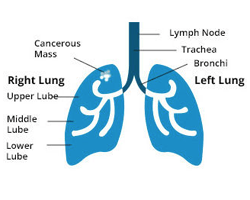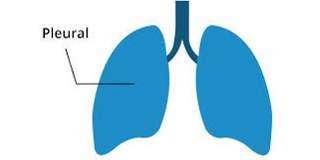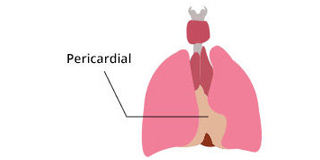 Mesothelioma is
a rare form of cancer that is caused by exposure to asbestos. It
usually forms in the lungs of those who have been exposed to this deadly
toxin, but sometimes occurs in the abdominal area. There are a number
of therapies available that can help prolong survival and minimize
symptoms and discomfort, but in most cases the cancer is too aggressive
and too advanced at the time of diagnosis to be cured
Mesothelioma is
a rare form of cancer that is caused by exposure to asbestos. It
usually forms in the lungs of those who have been exposed to this deadly
toxin, but sometimes occurs in the abdominal area. There are a number
of therapies available that can help prolong survival and minimize
symptoms and discomfort, but in most cases the cancer is too aggressive
and too advanced at the time of diagnosis to be curedThis disease specifically impacts a thin membrane that protects the lungs, heart and organs within the abdominal cavity and enables them to function properly.
This is called the mesothelium and the majority of cases of this type of cancer affect the pleura, the mesothelium that lines the lungs. Approximately 3,000 people are diagnosed with mesothelioma of all types in the United States every year. In most cases, these victims’ exposure took place on the job and the cause of the illness can be traced to an unsafe workplace.
With changing regulations and mitigation, exposure to asbestos is on the decline, but people continue to be diagnosed. This is because the disease has what is known as a long latency period. This means that the amount of time that can pass between the time of exposure to asbestos and the time that symptoms begin to appear can be as long as fifty years. It is an unfortunate reality that though medical science has made great strides in understanding how this deadly disease progresses and in various ways to prolong and improve the lives of those who have been diagnosed with the condition, it is still considered an incurable and usually fatal disease.
The Link Between Asbestos and Cancer
Asbestos is a natural mineral that is mined out of the ground. It has a unique set of properties that has made it useful for a number of applications. It resists heat and fire, electricity, and most chemicals, and so it has been used for millennia to insulate buildings and pipes, in fireproof materials, in caulk and joint compound, in filters, and even in dental casts. Exposure to asbestos is known to be a leading risk factor for mesothelioma, and those at the greatest risk are people who have been working around the mineral for years.Mesothelioma has traditionally impacted a wide variety of workers in different occupational settings, including industrial environments, school yards, auto repair shops, shipyards and municipal or public buildings. In most cases it takes an extended exposure to the toxin for cancer to form, but there have been notable instances in which people have been diagnosed after single instances of exposure, as well as short-term exposures.
Asbestos gets into the body through microscopic fibers that are either inhaled or ingested. Because these particles are so tiny and become embedded in cells so easily, they tend to remain in place for many years. Over time, the asbestos fibers cause mutations to occur within the cells in which they are embedding. These mutations cause inflammation and other damage, and their impact tends to be greatest in the delicate, thin lining that forms around the lungs. Eventually all this damage and inflammation can lead to a number of illnesses, potentially including mesothelioma.
This lining of the lungs is called the pleura. The lining of the abdominal cavity known as the peritoneum is similarly vulnerable to the damaging effects of asbestos, and is also a common location for the cancer to form. Once the scarring and inflammation process begins it goes on for several decades, continuing until it has formed into malignant tumors. Many people exposed to asbestos do not realize they have developed cancer until decades later.
Types of Asbestos-Related Cancer
The most common form of asbestos-related cancer is pleural mesothelioma, which forms in the lining of the lungs and makes up approximately 75 percent of all diagnosed cases. The second most common form is peritoneal, which accounts for between ten and twenty percent of cases, while another one percent of cases form in the pericardium. Even fewer are known to form in the testicles.Pleural

This type of asbestos-related cancer impacts the lining of the lungs. Because it is most common, the majority of research into treatment has focused on this type. Over long-term exposure to asbestos fibers, a person may inhale a lot of the particles. These get embedded in the pleura where they cannot be released. Over many years they cause inflammation and other types of damage that may lead to the formation of tumors.
Pericardial

This extremely rare form of asbestos-related cancer occurs in just one percent of all diagnosed cases. It is extremely difficult to treat because of the proximity of the disease to the heart. This cancer attacks the part of the mesothelium that lines the heart. This is called the pericardium. Only about 200 cases of this type of mesothelioma have ever been described in scientific journals.
Peritoneal

This extremely rare form of asbestos-related cancer occurs in just one percent of all diagnosed cases. It is extremely difficult to treat because of the proximity of the disease to the heart. This cancer attacks the part of the mesothelium that lines the heart. This is called the pericardium. Only about 200 cases of this type of mesothelioma have ever been described in scientific journals.
Testicular Mesothelioma
Also very rare is the type of mesothelioma that attacks the lining of the testicles. Less than one percent of cases of this disease are testicular. Most patients who do develop this form of mesothelioma have not been exposed to asbestos. Why this rare type of mesothelioma exists is not known and research is limited because there are so few cases of it.Symptoms of Mesothelioma
One of the most difficult aspects is the fact that its initial symptoms are so subtle and benign that in many cases they are ignored. As the disease slowly progresses into more advanced stages these mild symptoms become more pronounced and expand to include moderate pain, weight loss, and overall malaise or fatigue. By the time the patient is aware of these symptoms they have progressed so much that a visit to the doctor is scheduled, and the disease has already entered its later stages.Depending upon the type of cancer, symptoms of advanced disease can include pain around the site of the tumor, unexplained weight loss, constipation caused by bowel obstruction and a buildup of fluid in the chest or abdomen. There are a number of therapies available to relieve these symptoms. The specific symptoms by type of mesothelioma include:
- Pleural mesothelioma usually causes shortness of breath, chest pains, a painful cough, wheezing, coughing up blood, body aches, rattling when breathing, a build-up of fluid around the lungs, and a reduced ability to expand the chest or take a deep breath.
- Patients with peritoneal mesothelioma are likely to experience a loss of appetite followed by weight loss, fluid build-up in the abdomen, swelling and tenderness in the abdomen, a sense of being too full, hernias, distention in the abdomen, fatigue, and bowel obstruction
- The symptoms of pericardial mesothelioma are similar to those for the pleural form and include chest pains and difficulty breathing as the major signs of the disease.
- Understanding the symptoms of testicular mesothelioma is challenging because there are so few cases of it. In most instances the main indication of the disease is a lump or lumps in one or both of the testicles.
Diagnosing Mesothelioma
The first step in diagnosing any type of mesothelioma occurs when a patient experiences symptoms. The symptoms characteristic of this caner are not unique to it, so a visit to the doctor is necessary to rule out other causes. A general practitioner or internist can examine the patient and test for certain conditions, while also taking a medical history. In addition to symptoms, known exposure to asbestos is an indicator that mesothelioma may be possibleA general doctor will refer any patient suspected of having mesothelioma to an oncologist, or cancer specialist, for a definite diagnosis. There are a number of different methodologies used in diagnosing asbestos-related cancers and the one that is used in a specific case often depends upon how the disease has presented itself, the location of the tumor, and how advanced it is at the time of diagnosis. In most cases, a confirmed diagnosis comes from a combination of biopsies, laboratory studies and imaging studies such as MRI or X-Rays.
Often the first test is to drain fluid from the pleural or peritoneal cavities and to examine it for the presence of cancer cells. Imaging scans are next to look for any signs of potential tumors. These imaging tools may include X-rays, MRIs, PET scans, and CT scans. If the images show what could look like tumors, the next step is to biopsy them to be sure it is mesothelioma and to stage the disease.
Staging Mesothelioma
It is important not just to diagnose cancer, but to stage it. All kinds of cancers are staged from one through four and this allows doctors to accurately describe how far along the disease has progressed, to communicate that to specialists, and to provide the best treatment plan. There are a few different systems used to stage cancer, but all assign stage one to the least advanced and most curable cases and four to the most advanced. Stage one patients have the best odds of survival.Treating Mesothelioma
Once mesothelioma has been diagnosed and staged, treatment options can be discussed and chosen. There are a number of different therapies and courses of action that can be taken in treating this deadly form of asbestos-related cancer. The most common of these are surgery, chemotherapy and radiation therapy, and in many cases a multi-modality approach that uses more than one of these is used and has been found to provide the most promising results.
In addition to providing treatment in order to prolong survival, many of the therapies used for patients have the goal of providing relief from symptoms. These are known as palliative treatments, and they may be used for patients in all stages of the disease. There are also a number of alternative therapies being used to provide relief, and researchers are pursuing a number of experimental programs through clinical trials. These include immunotherapy, gene therapy and photodynamic therapies.
Surgery is offered with two separate goals in mind — it can be either curative or palliative. Curative therapy is generally offered to the healthiest patients who are in the disease’s earliest stages, while palliative is meant for late stage treatments to provide relief from uncomfortable or painful symptoms. Chemotherapy uses chemicals and medications to attack cancer cells. It can both shrink the tumors and kill the cells, thus stopping the spread of the disease as well as providing relief from pain and discomfort.
Prognosis
In trying to determine the expected course of a diagnosis, and the ultimate prognosis for the patient, much is based on the stage of the cancer. Though treatment options exist at both early and late stages, in most cases those whose condition is diagnosed earliest have the best overall chances of surviving the disease.Still, there are many factors that can determine the outcome of a particular case, including the type of cancer, the type of cell that the mesothelioma is made up of, the stage at the time of diagnosis, and the patient’s overall health. Working with the right medical team is another aspect of care that may impact the expected outcome for a patient.
Finding the Right Physician
The best place to begin when you suspect you may have mesothelioma, or you have symptoms that are similar to those described here, is with your trusted internist or family doctor. This professional can help guide you on your journey and help you find the best specialists. It is also always important to listen to your own body. If you are told you do not have the cancer, but you feel that you do, don’t hesitate to seek a second opinion.There are many highly skilled specialists who have dedicated themselves to the treatment of mesothelioma. These surgeons, radiologists, radiation oncologists, pathologists and palliative care practitioners often work collaboratively on a special treatment team. It is important to find doctors and other caregivers who make you feel comfortable. You also want the best experts, so don’t be afraid to ask questions and get credentials.
Finding the Right Facility
Just as it is important to seek out physicians who have specialized training in treating asbestos-related cancer, it is helpful to seek treatment from centers that have a wide range of experience in treating this rare disease. There are a number of highly respected treatment centers located across the country who are staffed with some of the world’s most skilled asbestos-related disease practitioners.Look for cancer centers, research and treatment facilities, and other treatment centers that have the top doctors and experts in mesothelioma. It’s also important to look at the types of treatments a center offers. Maybe you want the latest cutting edge treatments, or you are more comfortable with the tried and tested methods. Finally, be sure to look at costs, expenses of traveling if needed, and what your insurance plan will and will not cover as you start your treatment journey.
Clinical Trials and Research
Despite the seriousness of this disease, this asbestos-related cancer receives very little federal funding for research. There are, however, a number of clinical trials being conducted in an effort to find a cure or more effective treatments. Researchers from around the world engage in these studies in order to help find medications and therapies that will eradicate this rare disease.Patients struggling with a terminal illness like mesothelioma may be eligible to participate in clinical trials that are testing drugs and other strategies not yet approved for the general public. There are risks associated with unapproved treatments, but also the potential for great reward. Many people with terminal mesothelioma want to participate because they have few other options for saving their lives.

Paying for Treatment
Treatment for mesothelioma can be extremely expensive, and as a result it is essential that anybody who has been impacted by the disease avail themselves of all resources, including financial and legal avenues. In many cases the treatment that may be best for your particular case may not be fully funded by your insurance coverage, and for those patients without medical insurance the financial impact can be even more devastating.Alternatives to relying on insurance to pay for treatment include funding from nonprofit advocacy groups and charities. Patients can also consider lawsuits, settlements, and trust funds set up by employers who exposed them to asbestos in the workplace. These legal means of getting compensation can help to pay for expensive treatments.
Mesothelioma Trusts
Asbestos-related trust funds are financial resources for those exposed to asbestos on the job. They are established by corporations found responsible for asbestos injuries to their employees and to others. If you have been diagnosed with mesothelioma and are not sure where you may have been exposed, begin with your workplace. Workplace exposure is the most common source of asbestos that causes mesothelioma. If your employer has been found to have exposed employees you may have access to a trust fund or be able to seek compensation through other legal avenues.Veterans Affairs Benefits
Those mesothelioma patients whose asbestos exposure was a result of service in the United States military may be eligible for benefits that help with their expenses. Veterans are a special group at risk for mesothelioma due to asbestos exposure. Asbestos use in the military peaked between 1935 and 1975 and was most common in the U.S. Navy. Thousands of veterans die every year from exposure to asbestos.All veterans that were not dishonorably discharged have access to VA benefits, which includes care for mesothelioma. The VA does recognize this disease as being connected to service and provides disability compensation, dependency and indemnity compensation, special monthly compensation, and health care to patients who qualify.
Finding The Best Mesothelioma Lawyer
Once a patient is diagnosed, the primary
focus is necessarily on medical treatment, but it is also important to
remember that there are legal options and rights available as well.
Because this disease is generally caused by occupational exposure it may
be possible to file a claim with an asbestos trust fund in order to get
reimbursement for medical expenses from those responsible for the
exposure.
Lawsuits can also be filed, and may be
settled outside of court or in front of a judge or jury. In many cases
these legal actions can result in much-needed resources to help pay for
medical bills and provide for the victim’s family’s financial security.
People who have been diagnosed with
asbestos related cancer are often able to file lawsuits and win them
because of the fact that their disease is preventable and was caused by
the negligence of others. The history of asbestos exposure includes a
number of corporations, asbestos mining companies and other employers
who did not notify their employees about the dangers of asbestos
exposure despite having been aware of it.
This failure to notify and protect often puts them at fault. An experienced mesothelioma lawyer
will be able to tell you about the options that are available to you,
and what your rights may be. In most cases, lawsuits that are filed
against defendants for asbestos exposure are settled out of court.
Though the outcomes in these settlements can vary, they often result in a
quicker closure to the issue.
When a lawsuit reaches the court, the outcome can often be
unpredictable. Much depends upon the evidence that is provided in each
case, but there is an extensive history of large verdicts being awarded
to those who have been exposed to asbestos by their employer.Get Legal Help Today
When you or a special someone has been diagnosed with asbestos mesothelioma related lung cancer You or your loved one may be eligible for financial compensations. It is important that you contact one of our legal advocates to help you find the most experienced mesothelioma lawyer in your general area. Call For Free Consultation 1-800-692-8608 or contact us here


No comments:
Post a Comment